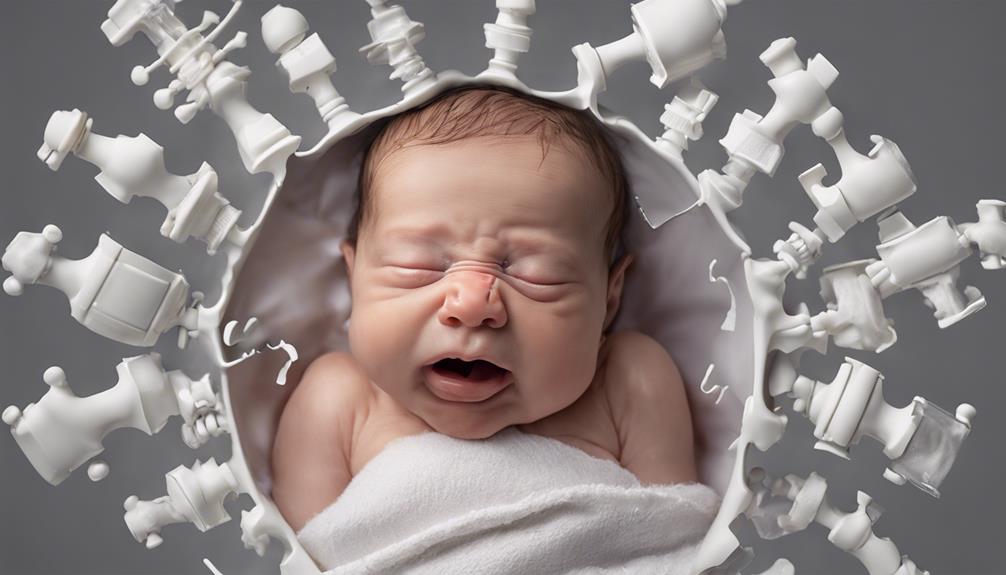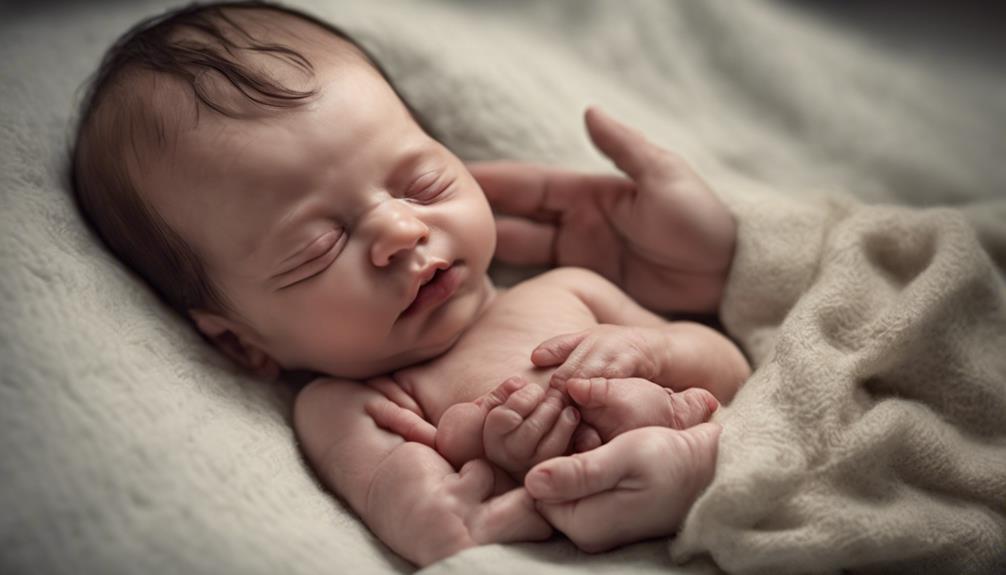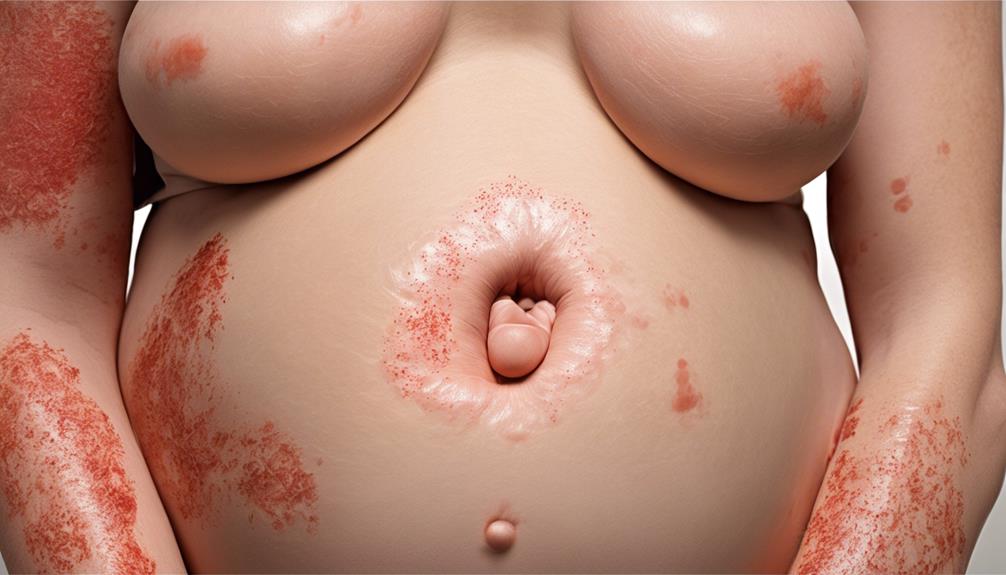Do you know that on average, newborn babies can experience hiccups up to multiple times a day, sometimes even after feeding?
Understanding why your little one gets hiccups so frequently can offer insights into their development and well-being.
While it might seem like a minor issue, the underlying reasons behind newborn hiccups can be intriguing and essential for ensuring your baby's comfort and health.
Stay tuned to uncover the mysteries behind your newborn's hiccup episodes and how you can effectively address them.
Key Takeaways
- Newborn hiccups are common due to immature diaphragm and nervous system.
- Hiccups are part of healthy development and usually harmless.
- Triggers like overfeeding or sudden movements can cause hiccups.
- Alleviate discomfort by upright positioning, burping, and pacifier use.
Common Occurrence in Newborns
Newborn hiccups are a common and expected phenomenon in babies, often occurring after feeding or moments of excitement. These little hiccups are due to the diaphragm's immaturity and the developing nervous system in your precious little one. It may seem concerning at first, but rest assured, these hiccups are a normal physiological response and typically nothing to worry about. In fact, most newborns experience these hiccups regularly, and it's all part of their healthy development.
As your baby grows, you may notice that the frequency of hiccups decreases over time. While it can be unsettling to see your newborn experience hiccups, remember that it's a common occurrence and usually poses no harm. Embracing these moments as part of your baby's journey to maturity can bring comfort during these seemingly small yet significant episodes. Just keep an eye on your little one, and cherish these early signs of growth and development.
Potential Triggers for Hiccups
If your baby is experiencing frequent hiccups, it's important to ponder potential triggers that may be contributing to this common occurrence. Baby hiccups can be caused by the immaturity of the nerve that controls the diaphragm, leading to the reflex being more pronounced in premature babies.
Overfeeding, sudden temperature changes, and swallowing air during feeding are also common culprits for those adorable hiccups. In addition, coordination issues in breathing and swallowing can play a role in triggering hiccups in newborns.
Understanding these triggers can help you better navigate and support your little one through this normal developmental phase. Remember, while hiccups can be bothersome at times, they're generally not a cause for concern and often resolve on their own.
Keep an eye on these triggers and know that you're doing a great job caring for your baby through each hiccup-filled moment.
Alleviating Newborn Discomfort

To ease your baby's discomfort from hiccups, consider positioning them upright and gently burping them to release trapped air. This simple technique can help alleviate the hiccup episodes that may interfere with regular feeding.
Offering a pacifier or something for your baby to suck on can also aid in relaxing the diaphragm, potentially reducing the frequency of hiccups.
If these methods don't provide sufficient relief, consulting with a pediatrician about the use of gripe water drops may be beneficial. Remember, as your baby grows older, their reflexes develop, and the frequency of hiccups typically decreases.
It's important to allow hiccups to pass naturally, as this is a safe and effective way to manage this common occurrence in newborns. By following these gentle strategies, you can help your baby find comfort and relief from infant hiccups.
Understanding the Causes

Understanding the causes of newborn hiccups can provide valuable insight into why your baby may be experiencing this common phenomenon.
Hiccups in babies are most likely caused by the immaturity of the nerve that controls the diaphragm. This immaturity can result in sporadic contractions that lead to hiccups. Additionally, gastroesophageal reflux, a condition where stomach contents flow back into the esophagus, can also trigger hiccups in newborns.
Remembering that hiccups in babies are a normal part of development and are typically nothing to worry about. Newborns' developing reflexes make them more susceptible to hiccups, which can be brought on by sudden movements, excitement, or even during or after feeding.
Promoting Baby's Comfort

Positioning your baby upright after feeding can help reduce hiccups by preventing regurgitation of milk and promoting comfort. It's important to create a calm and peaceful environment during feeding to help your little one relax and minimize the chances of hiccups.
Using slow-flow nipples on bottles can also prevent air gulping, reducing the likelihood of hiccups. Remember to feed your baby regularly and make sure they've proper breaks to avoid overfeeding, which can put pressure on the diaphragm and lead to hiccups.
Burping the baby frequently during and after feeds is vital to release any trapped air and alleviate hiccups effectively. Providing your baby with something to suck on, like a pacifier, can also help soothe them and reduce the frequency of hiccups, which are common in babies.
Frequently Asked Questions
What Does It Mean When a Newborn Hiccups a Lot?
When your newborn hiccups a lot, it's usually because their nervous system is still developing. This causes their diaphragm to contract frequently. It's normal and shows healthy growth. As they mature, the hiccuping will likely decrease.
When Are Baby Hiccups a Concern?
When your baby's hiccups persist, interfere with feeding or sleeping, or come with other symptoms like coughing or difficulty breathing, it's wise to consult a healthcare provider. Trust your instincts and seek guidance for reassurance.
How Do You Stop Hiccups in a Newborn?
To stop hiccups in your newborn, try burping them frequently, keeping them upright after feeds, offering a pacifier, and ensuring a calm environment. If hiccups persist, consult your pediatrician for further guidance.
Do Hiccups Mean Baby Is in Distress?
Hiccups in newborns usually don't indicate distress. They're a natural part of development. Your baby isn't necessarily in pain or discomfort when hiccupping. It's common, harmless, and often resolves on its own.
Conclusion
So next time your little one starts hiccupping, remember it's just their body's way of developing and growing. By gently soothing and comforting them, you can help alleviate any discomfort.
Just like a symphony conductor guiding the orchestra, you can help orchestrate your baby's comfort and well-being. Keep calm, stay informed, and cherish these precious moments of caring for your newborn.









